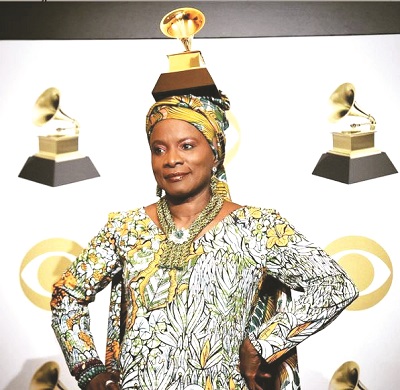

The story of Angelique Kidjo is a remarkable one. Known affectionately as “Mama Africa”, Kidjo is a multi-award-winning singer, songwriter, and activist from Benin. Her music is an eclectic mix of Afro-fusion, funk, and traditional West African styles that have made her a global phenomenon. From her early days as a backup singer for a local band to becoming one of the most respected artists in the world, Angelique Kidjo has made an indelible mark on the music industry.
Angelique Kidjo’s childhood
The story of Angelique Kidjo began in the small town of Ouidah in Benin, West Africa. She was born to a large, music-loving family and her father was an Afro-Cuban percussionist. Growing up, Angelique was surrounded by a wide variety of musical styles, from traditional African folk and religious music to modern Latin and American pop. She learned to play the piano and drums and also sang with her church choir. Her father introduced her to traditional African rhythms, which she found to be incredibly inspiring. Despite her humble beginnings, Angelique had a passion for music that would eventually take her all around the world.
Her discovery of music
The story of Angelique Kidjo’s musical journey began in her hometown of Cotonou, Benin. As a child, she was exposed to a range of traditional and modern African music styles, as well as Western music from the likes of James Brown, Marvin Gaye, and Miriam Makeba. At the age of six, she began singing in her school choir, and soon developed an interest in playing drums and percussion instruments. This eventually led her to develop an affinity for guitar, which she learned from her elder brother.
By the time she was a teenager, she had already joined a local band and had become a popular figure on the local music scene. She began to gain international recognition in the early 1990s when her album Logozo was released. The album featured her unique blend of Afro-pop, funk, and traditional Beninese folk music. The album was widely acclaimed and gained her a following around the world.
Since then, Angelique Kidjo has gone on to become one of the most successful African musicians of all time. She has received numerous awards and accolades, and has performed in some of the world’s most prestigious venues. She continues to use her music as a platform to promote African culture, social justice, and human rights.
Her musical influences
Angelique Kidjo has a unique and varied sound, but she credits many different influences for her music. She grew up listening to jazz and African music, including Benin’s traditional Zilin and Sato music, as well as the traditional music of her father’s homeland, the Congo. She was also heavily influenced by western pop, particularly the work of iconic artists such as James Brown and Jimi Hendrix.
In addition, Kidjo is deeply inspired by other African musicians from countries such as Nigeria, Mali, and Ghana. She often collaborates with these artists, as well as with American artists such as Santana and John Legend. Through her collaborations, she has been able to incorporate various genres into her music, creating a sound that is truly global in scope.
Kidjo’s other musical influences include Latin rhythms, Brazilian samba, reggae, and jazz. She even incorporates elements of funk into her own music. By drawing from so many different genres, she has created a sound that is both distinct and accessible. Her music serves as a bridge between cultures, and she has become an ambassador for African music around the world.
Her career highlights
Angelique Kidjo is one of the most successful African female artists in the world. She has released thirteen albums and has sold more than six million records worldwide. She has also collaborated with many great artists, including Branford Marsalis, Carlos Santana, Bonnie Raitt, Alicia Keys, Peter Gabriel, and more.
Kidjo’s musical career began to take off in the early 90s when she was signed to Island Records. Her debut album Logozo was a major success and was met with critical acclaim. The album was nominated for a Grammy award and won several other awards in Europe. Her follow-up albums were also very successful.
In 2001, Kidjo released her fourth studio album titled Black Ivory Soul, which was certified gold and sold over three million copies. It featured many influential African and international artists, such as Youssou N’Dour, Angélique Ionatos, and others.
Her fifth album Djin Djin (2007) was produced by legendary producer Brian Eno and won a Grammy Award for Best Contemporary World Music Album. In 2019, Kidjo released her thirteenth studio album titled Celia, an ode to the legendary Cuban singer Celia Cruz. The album received numerous awards, including a Latin Grammy Award for Best Contemporary Pop Vocal Album.
Kidjo has also been recognized by her peers and has received numerous awards, including being appointed UNICEF Goodwill Ambassador in 2002. She was also named one of Time Magazine’s 100 Most Influential People of 2020 and is a recipient of the Chevalier of Arts and Letters award from the French government.
Angelique Kidjo continues to make music that defies genre boundaries and her career highlights prove that she is one of the most talented and successful African female artists in the world.
Her philanthropy work
Angelique Kidjo is a big believer in the power of music to bring people together, which is why she has committed herself to using her fame and influence to help those in need. She has worked closely with many charities throughout her career, ranging from UNICEF to the Clinton Global Initiative. In 2016, Kidjo launched her own charity, Batonga Foundation, which seeks to empower African girls through education. She has also been an advocate for human rights issues, speaking out against inequality and injustice wherever she sees it. Through her work, she hopes to bring hope and opportunity to those who may otherwise lack it. Her passionate dedication to making a difference and bettering the world continues to be an inspiration to us all.
What the future holds for Mama Africa
The future for Angelique Kidjo looks bright as ever. She is continuing to use her platform to advocate for human rights, promote education, and challenge inequality. Her latest album “Celia” is a tribute to the life and work of Latin American music icon Celia Cruz. Which shows that she is still evolving artistically. Kidjo also works with The Batonga Foundation to empower young girls in her home country of Benin through education. She also continues to collaborate with other African artists to promote African culture globally.
In the years ahead, we can expect Kidjo to continue her philanthropic efforts and spread her inspiring message of hope and resilience. As one of Africa’s most recognized artists. She is determined to use her influence to create positive change and help build a brighter future. Angelique Kidjo is sure to continue bringing joy to her fans all over the world. Through her unique musical style and captivating performances.




